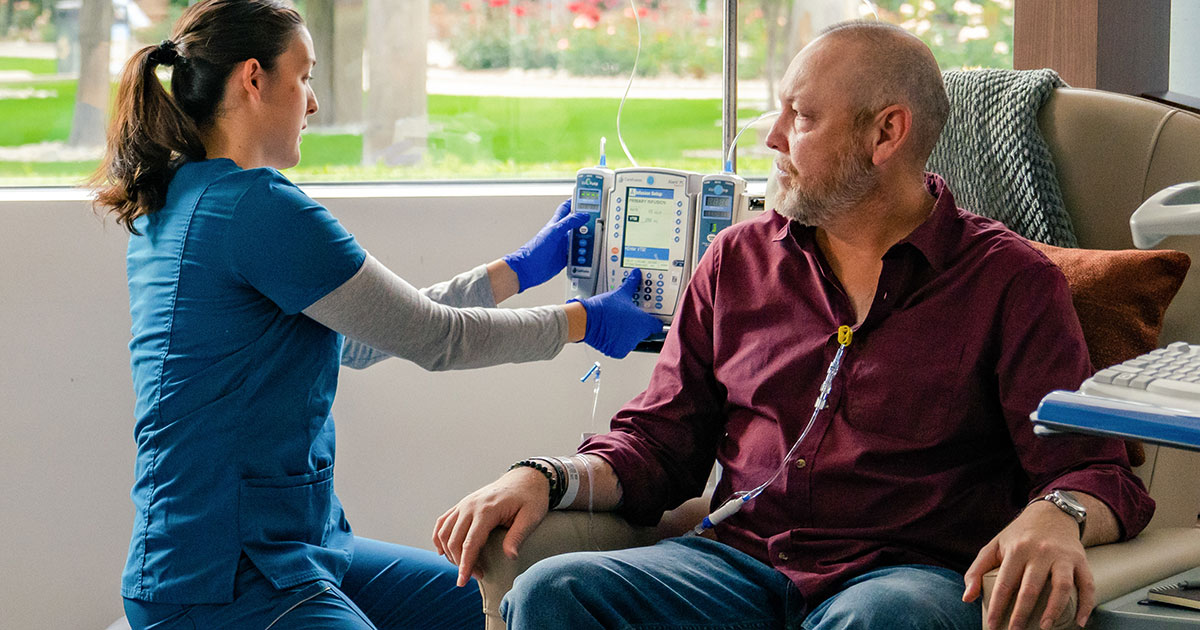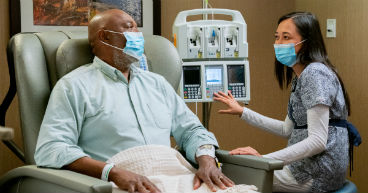
Chemotherapy has been a go-to treatment for fighting cancer for decades. But now, a growing number of cancer patients may not even need it as part of their treatment regimen.
Chemotherapy is still regularly used in cancer treatment—either by itself or in combination with other therapies—but oncologists also have a variety of newer cancer-fighting drugs at their disposal. Some may be preferred options to chemotherapy depending on the type of cancer being treated.
Cancer patients may welcome the new alternatives, in light of chemotherapy’s potential difficult side defects, such as hair loss, nausea and vomiting and so-called “chemo brain,” which affects a person’s focus and concentration.
In addition to the increasing number of alternatives to chemotherapy, more information is available now to help cancer doctors determine who is likely to benefit from chemotherapy drugs and when they may amount to overkill when treating a disease that may already be under control or eliminated.
In this article, we’ll explore:
- Types of cancer treatment
- Immunotherapy for cancer
- Comparing side effects
- CAR T-cell therapy
- Neoadjuvant treatment
- Adjuvant treatment
- Cancer surgery—with or without radiation
- Are cancer standard-of-care treatments changing?
If you’ve been diagnosed with cancer and are interested in a second opinion on your diagnosis and treatment plan, call us or chat online with a member of our team.
Types of cancer treatment
Chemotherapy drugs use powerful chemicals to kill cancer cells. These cytotoxic drugs are systemic, meaning they go through the whole body. They are designed to kill rapidly growing cells, but they don’t distinguish between healthy and cancerous cells in their attack. So, chemotherapy may also kill fast-growing cells in the digestive track, in hair follicles or in bone marrow, and may cause side effects.
Other cancer treatments include:
Surgery. An operation may be prescribed to remove cancerous tumors from the body. Surgery is often done in combination with chemotherapy or other treatments, which are designed to shrink the tumor before surgery (neoadjuvant therapy) or to eliminate any remaining cancer cells after surgery (adjuvant therapy).
Targeted therapy. Unlike chemotherapy’s systemic attack, targeted therapy uses lab-created monoclonal antibodies that specifically seek out cancer cells and disrupt the cells from growing. Some targeted therapy involves a form of chemotherapy (antibody drug conjugates, or ADCs) that carry the cytotoxic drug directly to the cancer site rather than releasing it throughout the body.
Immunotherapy. Drugs called checkpoint inhibitors are used in this therapy, not to attack the cancer but to awaken the body’s own immune system to the presence of cancer, triggering an aggressive immune response to initiate its own attack.
Radiation therapy. This therapy exposes cancer cells to high-energy radiation to kill the cells. The radiation source may be a beam from a machine outside the body that is directed at the cancer, or from radioactive material placed inside the body near a tumor.
Hormone therapy. Because hormones may cause some cancers to grow, this therapy uses synthetic hormones or other drugs to block the body’s hormones that are contributing to cancer growth. Surgery may also be used to remove the glands that make those hormones.
Immunotherapy for cancer
The growing attention to chemotherapy alternatives is largely due to the rapid rise of immunotherapy. Cancer cells are great at hiding from the body’s natural immune system, or disguising themselves as something that is not seen as harmful to the body. Immunotherapy helps the immune system recognize the cancer cells for what they are and set the body’s own cancer-fighting abilities in motion.
Immunotherapy drugs were initially used post-surgery, or in cases where chemotherapy had already been used and had been ineffective at eliminating the cancer.
Some studies now suggest that rather than waiting until after surgery, immunotherapy may be more effective as a first-line treatment, when there is more cancer in the body for the immune system to identify. Some studies have shown certain immunotherapies may even eliminate the need for surgery.
Still, like chemotherapy, immunotherapy may carry its own potential side effects.
“In most settings the toxicities are overall less serious, but this is not always the case,” says Maurie Markman, MD, President of Medicine & Science for City of Hope Atlanta, Chicago and Phoenix. “It is important that patients be provided with all relevant information regarding not only the risk of side effects, but also the magnitude and duration of possible negative effects if they should occur.”
Comparing side effects
Chemotherapy and immunotherapy share some common potential side effects, including:
- Digestive issues, such as nausea, vomiting, diarrhea or constipation
- Fatigue
- Changes in appetite
The potential side effects of chemotherapy alone include:
- Hair loss
- Chemo brain
- Mouth sores and pain with swallowing
- Easy bruising and bleeding
- Infection
- Anemia
- Peripheral neuropathy
- Skin and nail changes, or excessive dryness
- Kidney problems and bladder (urine) changes
- Weight changes (loss or gain)
- Mood swings
- Changes in libido and sexual function
- Fertility problems
Some of the common side effects of checkpoint inhibitors, a form of immunotherapy, include:
- Cough
- Skin rash
- Muscle and joint pain
Checkpoint inhibitors also have more serious side effects that are less common, including those listed below.
Infusion reactions: This may be similar to an allergic reaction, possibly including fever, chills, a rash, itchy skin, feeling dizzy, wheezing and trouble breathing.
Autoimmune reactions: The immune system may respond to treatment by attacking other parts of the body. These reactions may cause serious or even life-threatening problems in the lungs, intestines, liver, hormone-making glands, kidneys or other organs.
CAR T-cell therapy
Another form of immunotherapy is being used more frequently in the treatment of blood cancers. In chimeric antigen receptor (CAR) T-cell therapy, T-cells from the body’s immune system are harvested from the patient, genetically modified and multiplied in a laboratory, and then returned to the patient’s body. While CAR T-cell therapy may be used instead of chemotherapy, it also has some severe potential side effects.
One major concern is the potential rapid release of cytokines into the blood stream, a condition called cytokine release syndrome (CRS). CRS symptoms may range from mild flu-like symptoms to potentially life-threatening anaphylactic shock.
Scientists have also been developing bispecific antibodies, similar to CAR T-cells, that are made without using the patient’s own T-cells. Researchers hope bispecific antibodies will prove to produce fewer severe side effects. They are designed to attach both to a cancer cell and an immune system T-cell antigen, redirecting the immune system to focus on the cancer.
Neoadjuvant treatment
The advancements in immunotherapy have given chemotherapy new competition at an early stage of cancer progression. Some small clinical trials have found immunotherapy may be all that is needed to eradicate some locally advanced cancers restricted to their original location or those that have only expanded to nearby lymph nodes.
One trial looked at the treatment of locally advanced colorectal cancer. The study of the immunotherapy drug pembrolizumab (Keytruda®), an immune checkpoint inhibitor, found that about half of the trial’s 35 participants opted for surgery following up to six months of the immunotherapy drug, but more than half of those had no indication of cancer in the tissue that was removed.
The other 18 participants were on pembrolizumab for as long as a year and received no further treatment. Virtually all experienced a significant reduction in the size of their tumors, with many showing no evidence of cancer remaining.
Adjuvant treatment
Recent research has also explored the common practice of prescribing chemotherapy following cancer surgery, including for HER-2 positive breast cancer. The research looked for measurable differences in outcomes between people who have chemotherapy as a secondary treatment for specific cancers and those who don’t.
Some of these studies have found no clear benefit to prescribing chemotherapy following cancer surgery. While chemotherapy may sound like a good idea as a fail-safe to try to make sure all the cancer is gone following surgery, it turns out the added therapy in some instances may be unnecessarily exposing the patient to the drug’s negative side effects.
These studies have some doctors paying more attention to the patient’s quality of life, the toll chemotherapy may take, and the expected benefit. They may be more open to suggesting scaling back some of these therapies, a practice known as de-escalation, based on research findings.
Are chemotherapy drugs becoming obsolete?
The advancements in cancer care don’t necessarily point to a future that eliminates chemotherapy from all cancer drug regimens. A 2019 study estimated that more than half of new cancer cases extending out to 2040 will still require chemotherapy treatment.
While immunotherapy shows much promise, some cancer studies have found immunotherapy drugs combined with chemotherapy to be more effective than just using those immunotherapy drugs by themselves. One 2021 study in China reviewed seven clinical trials and concluded that the combination is effective as the first-line treatment for advanced or metastatic squamous non-small cell lung cancer (NSCLC), although it said the risk of an adverse reaction was relatively high.
In the future, I suspect we will see certain clinical settings where immunotherapy may replace cytotoxic chemotherapy, but it is perhaps more likely that we will see the combination of known effective cytotoxic strategies with an immunotherapeutic agent as becoming standard-of-care,” Dr. Markman says. “There is a relative lack of overlapping side-effect profiles for standard chemotherapy drugs and checkpoint inhibitors, permitting such combination approaches to disease management.”
Chemoimmunotherapy is the prescription of a chemotherapy drug and an immunotherapy drug as part of a treatment regimen. It may be the use of an antibody drug conjugate (ADC), where a monoclonal antibody is linked to a cytotoxic payload, which is released when the antibodies attach to specific markers near the cancer cells.
Cancer surgery—with or without radiation
As with chemotherapy, new studies have examined when radiation therapy is needed and not. Researchers are looking at how radiation has been used in the treatment of cancer and whether it improves outcomes following surgery—or if it may not be needed in all instances in which it is currently standard-of-care treatment.
A pair of studies released in 2022 showed some cases where radiation therapy and chemotherapy used post-surgery were not needed. One, a study in the New England Journal of Medicine, found all 12 patients treated with dostarlimab (Jemperli®) for six months for locally advanced rectal cancer had a complete response with no tumor detection and no use of chemotherapy or radiation therapy.
Are cancer standard-of-care treatments changing?
Scientific breakthroughs are changing standards of care and will affect how and when chemotherapy is used in the future.
However, despite the advancements being made, the changes require much more research and are emerging only gradually. A study in the March 2022 JAMA Network Open looked at 207 cancer drugs approved between 2016 and 2021. It found that 14 percent of new drug approvals led to new standards of care, and another 15 percent provided market competition for existing standards of care. The remainder were either add-on or maintenance drugs (29 percent) or drugs for patients who had exhausted other options (42 percent).
While there is justified enthusiasm for the high volume of new cancer drug approvals in oncology and malignant hematology, these approvals must be evaluated in the context of their use,” the study said. “It is evident that further research and cancer drug development is required to drastically change the treatment landscape for many oncologic and malignant hematologic conditions.”
If you’ve been diagnosed with cancer and are interested in a second opinion on your diagnosis and treatment plan, call us or chat online with a member of our team.



